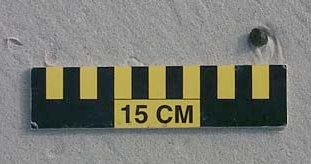Tarball (oil) on:
[Wikipedia]
[Google]
[Amazon]
 A tarball is a blob of
A tarball is a blob of
 A tarball is a blob of
A tarball is a blob of petroleum
Petroleum, also known as crude oil, or simply oil, is a naturally occurring yellowish-black liquid mixture of mainly hydrocarbons, and is found in geological formations. The name ''petroleum'' covers both naturally occurring unprocessed crud ...
which has been weathered after floating in the ocean. Tarballs are an aquatic pollutant
A pollutant or novel entity is a substance or energy introduced into the environment that has undesired effects, or adversely affects the usefulness of a resource. These can be both naturally forming (i.e. minerals or extracted compounds like o ...
in most environments, although they can occur naturally and as such are not always associated with oil spill
An oil spill is the release of a liquid petroleum hydrocarbon into the environment, especially the marine ecosystem, due to human activity, and is a form of pollution. The term is usually given to marine oil spills, where oil is released into t ...
s.
Tarball concentration and features have been used to assess the extent of oil spills
An oil spill is the release of a liquid petroleum hydrocarbon into the environment, especially the marine ecosystem, due to human activity, and is a form of pollution. The term is usually given to marine oil spills, where oil is released into th ...
and their composition can also be used to identify their sources of origin. They are slowly decomposed by microorganism
A microorganism, or microbe,, ''mikros'', "small") and ''organism'' from the el, ὀργανισμός, ''organismós'', "organism"). It is usually written as a single word but is sometimes hyphenated (''micro-organism''), especially in old ...
s such as '' Chromobacterium violaceum'', ''Cladosporium resinae
''Amorphotheca resinae'' is an ascomycete fungus of the family Amorphothecaceae which is known to thrive in environments containing alkanes (and water), like aviation fuel
Aviation fuels are petroleum-based fuels, or petroleum and syntheti ...
'', ''Bacillus submarinus
''Bacillus submarinus'' is a species in the genus ''Bacillus,'' meaning it is rod shaped while being capable of producing endospores. ''B. submarinus'' is Gram + , where there is a thick layer of peptidoglycan in its cell wall.
Description
''Bac ...
'', ''Micrococcus varians
''Micrococcus'' (mi’ krō kŏk’ Əs) is a genus of bacteria in the Micrococcaceae family (biology), family. ''Micrococcus'' occurs in a wide range of environments, including water, dust, and soil. Micrococci have Gram-positive spherical cell ...
'', ''Pseudomonas aeruginosa
''Pseudomonas aeruginosa'' is a common encapsulated, gram-negative, aerobic– facultatively anaerobic, rod-shaped bacterium that can cause disease in plants and animals, including humans. A species of considerable medical importance, ''P. a ...
'', ''Candida marina
Candida, or Cándida (Spanish), may refer to:
Biology and medicine
* ''Candida'' (fungus), a genus of yeasts
** Candidiasis, an infection by ''Candida'' organisms
* Malvasia Candida, a variety of grape
Places
* Candida, Campania, a ''comu ...
'', and ''Saccharomyces estuari
''Saccharomyces'' is a genus of fungi that includes many species of yeasts. ''Saccharomyces'' is from Greek σάκχαρον (sugar) and μύκης (fungus) and means ''sugar fungus''. Many members of this genus are considered very important in f ...
''.
Tarballs may be dispersed over long distances by deep sea currents
Currents, Current or The Current may refer to:
Science and technology
* Current (fluid), the flow of a liquid or a gas
** Air current, a flow of air
** Ocean current, a current in the ocean
*** Rip current, a kind of water current
** Current (stre ...
. The density of tarballs depends on the solids picked up in the weathering process. They can range in density
Density (volumetric mass density or specific mass) is the substance's mass per unit of volume. The symbol most often used for density is ''ρ'' (the lower case Greek letter rho), although the Latin letter ''D'' can also be used. Mathematicall ...
with some being more dense than seawater
Seawater, or salt water, is water from a sea or ocean. On average, seawater in the world's oceans has a salinity of about 3.5% (35 g/L, 35 ppt, 600 mM). This means that every kilogram (roughly one liter by volume) of seawater has appro ...
, which, at 1.025 g/ml, is more dense than the density of fresh water
Fresh water or freshwater is any naturally occurring liquid or frozen water containing low concentrations of dissolved salts and other total dissolved solids. Although the term specifically excludes seawater and brackish water, it does incl ...
. When the tarballs are less dense than seawater, they can travel over great distances.
They can also be contained like oil and picked up using a variety of methods. Containment booms
Containment was a geopolitical strategic foreign policy pursued by the United States during the Cold War to prevent the spread of communism after the end of World War II. The name was loosely related to the term '' cordon sanitaire'', which wa ...
can be used to isolate tarballs similar to methods used to isolate oil.
References
Further reading
* * {{refend *Tarball Ocean pollution Environmental impact of the petroleum industry Petroleum geology